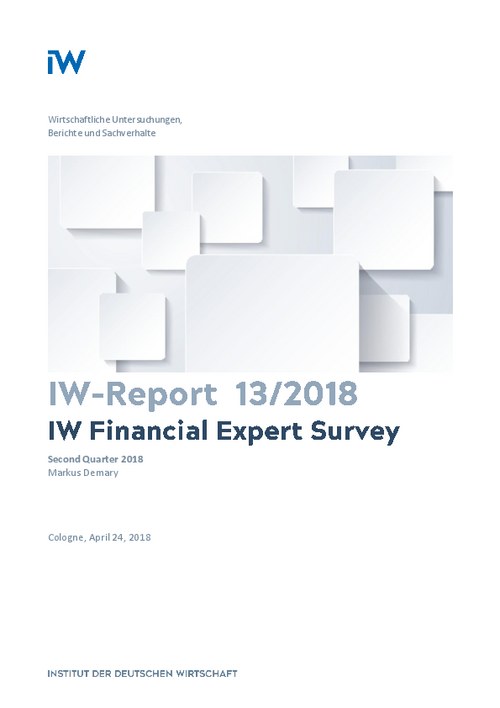In the IW Financial Expert Survey for the second quarter of 2018 the surveyed experts predict, on average, a steeper yield curve, i.e. a larger increase in the long-term than in the short-term interest rate.

Second Quarter 2018: IW Financial Expert Survey

In the IW Financial Expert Survey for the second quarter of 2018 the surveyed experts predict, on average, a steeper yield curve, i.e. a larger increase in the long-term than in the short-term interest rate.
Moreover, the average forecasts indicate higher stock market indices, a depreciation of the Euro vis-à-vis the US Dollar, and lower oil prices by the end of the third quarter of 2018. However, despite the expectation of higher interest rates, the short-term interest rate is predicted to remain in negative territory. The 3-month Euribor is, on average, expected to reach -0.31 percent at the end of the third quarter of 2018, while the yield on German government bonds with 10-year maturity is expected to reach 0.81 percent by then. However, the experts do not expect the European Central Bank (ECB) to change the forward guidance of its monetary policy significantly. Stock markets are, on average, expected to increase by 9.2 percent (Stoxx 50) and 8.4 percent (DAX 30) until the end of the third quarter of 2018. During that same period, the experts predict the Euro to depreciate by 2.5 percent vis-à-vis the US Dollar, while oil prices are expected to fall by 7.8 percent.
The expectation of an increase in the long rate and a slight increase in the short rate, together with the expected delayed monetary tightening of the ECB, hints at a financial market outlook characterised by a cautious approach to monetary policy normalisation. In this cautious approach, the ECB lets the market determine the first increases in long-term interest rates before it stops intervening at the long end of the yield curve, while keeping the short end of the yield curve lower. This cautious approach to monetary policy normalization is reflected in the projections of the yield curve. Moreover, the experts expect that the development of the Euro and the development of oil prices as well as the development of the stock market will support the ECB’s cautious approach to monetary normalization instead of forcing a faster exit from low interest rates. The experts do not expect the ECB to change its forwards guidance in the forthcoming Governing Council meeting.
The evaluation of the forecasting performance of the latest forecasts yields the result that Commerzbank and DZ Bank performed best in predicting trends within the long-term ranking, which covers all forecasts from March 2015 to March 2018. DekaBank and Deutsche Bank performed best in the short-term ranking, which covers the surveys for the third and the fourth quarter of 2017 for the 3-months ahead prediction and the survey for the third quarter of 2017 for the 6-month forecasts. When it comes to point prediction, in the long-term evaluation of the period running from March 2015 to March 2018, the experts of National-Bank performed best in predicting all indicators, while the Postbank experts produced the most precise point forecasts for all indicators for the short-term evaluation period.

Second Quarter 2018: IW Financial Expert Survey


Fin.Connect.NRW-Fachveranstaltung: Banken werden klimaneutral – Welche Konsequenzen ergeben sich für Unternehmen?
Die globalen Megatrends Demografie, Dekarbonisierung, Digitalisierung und De-Globalisierung treffen auf die Industrieregion NRW. Um den Strukturwandel erfolgreich zu bewältigen, müssen die Unternehmen in NRW jährlich 98 Mrd. Euro in Dekarbonisierung und ...
IW
Wie hoch sind die Investitionsbedarfe in die klimaneutrale und digitale Transformation in NRW?
Für die Finanzierung der klimaneutralen und digitalen Transformation müssen in NRW jährlich mindestens 100 Mrd. Euro investiert werden. Dies ergab diese Meta-Analyse der vorhandenen Studien zum Investitionsbedarf in die Digitalisierung. Dabei fallen allein zur ...
IW